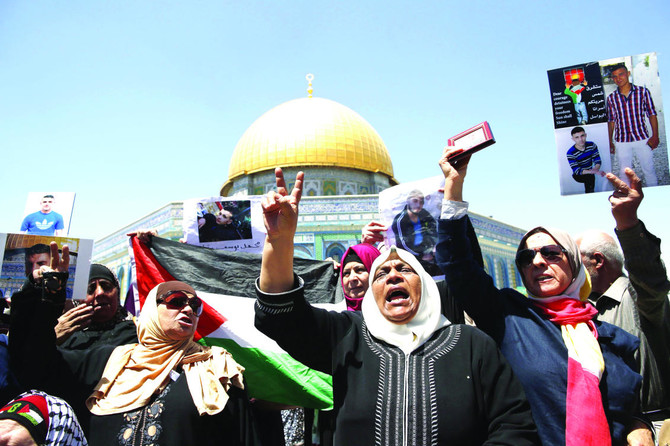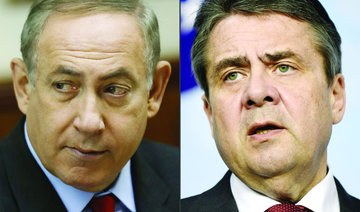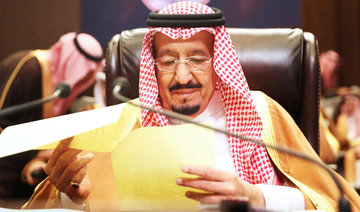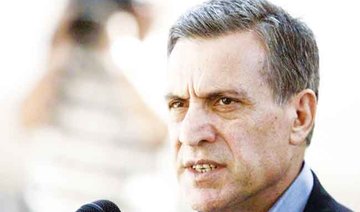RAMALLAH: Dozens of protesters were wounded at West Bank demonstrations in support of hunger-striking prisoners held by Israel, Palestinian health officials said Friday.
Spokesman Anas Diek said three people were hospitalized, including one who was shot in the head by a rubber bullet and another who was hit in the knee by a tear gas canister. He said others were treated on the scene, including for inhaling tear gas, but he had no further details.
Ahmad Bitawi, director of Ramallah Hospital, said more than 20 people were injured. He said most were leg injuries and not life-threatening.
In Bethlehem, protesters waved flags with photos of Marwan Barghouti, the jailed leader who called for the hunger strike.
Some 6,500 Palestinians are currently in Israeli lockups. Israel calls them security prisoners — held for offenses ranging from stone-throwing to carrying out attacks that killed or wounded Israeli civilians and soldiers.
Palestinians say between 1,300 and 1,500 prisoners have been on a hunger strike for 12 days demanding better conditions. Israel puts the number at about 1,100.
The Israeli military said about 2,000 Palestinians “participated in violent riots” at several places in the West Bank on Friday. It said soldiers responded with riot control procedures but did not elaborate.
Barghouti, a leader of the 2000 Palestinian uprising, is serving five life terms after being convicted by an Israeli court of directing two shooting attacks and a bombing that killed five people. Barghouti, who disputed the court’s jurisdiction and did not mount a defense, has been in prison since 2002.
Polls suggest that the 58-year-old Barghouti is the most popular choice among Palestinians to succeed the 82-year-old Palestinian President Mahmoud Abbas.
Dozens wounded at protests for Palestinians jailed in Israel
Dozens wounded at protests for Palestinians jailed in Israel

Syria moves military reinforcements east of Aleppo after telling Kurds to withdraw

- The United States, which for years has supported Kurdish fighters but also backs Syria’s new authorities, urged all parties to “avoid actions that could further escalate tensions” in a statement by the US military’s Central Command chief
ALEPPO: Syria’s army was moving reinforcements east of Aleppo city on Wednesday, a day after it told Kurdish forces to withdraw from the area following deadly clashes last week.
The deployment comes as Syria’s Islamist-led government seeks to extend its authority across the country, but progress has stalled on integrating the Kurds’ de facto autonomous administration and forces into the central government under a deal reached in March.
The United States, which for years has supported Kurdish fighters but also backs Syria’s new authorities, urged all parties to “avoid actions that could further escalate tensions” in a statement by the US military’s Central Command chief Admiral Brad Cooper.
On Tuesday, Syrian state television published an army statement with a map declaring a large area east of Aleppo city a “closed military zone” and said “all armed groups in this area must withdraw to east of the Euphrates” River.
The area, controlled by Kurdish forces, extends from near Deir Hafer, around 50 kilometers (30 miles) from Aleppo, to the Euphrates about 30 kilometers further east, as well as toward the south.
State news agency SANA published images on Wednesday showing military reinforcements en route from the coastal province of Latakia, while a military source on the ground, requesting anonymity, said reinforcements were arriving from both Latakia and the Damascus region.
Both sides reported limited skirmishes overnight.
An AFP correspondent on the outskirts of Deir Hafer reported hearing intermittent artillery shelling on Wednesday, which the military source said was due to government targeting of positions belonging to the US-backed, Kurdish-led Syrian Democratic Forces.
‘Declaration of war’
The SDF controls swathes of the country’s oil-rich north and northeast, much of which it captured during Syria’s civil war and the fight against the Daesh group.
On Monday, Syria accused the SDF of sending reinforcements to Deir Hafer and said it would send its own personnel there in response.
Kurdish forces on Tuesday denied any build-up of their personnel and accused the government of attacking the town, while state television said SDF sniper fire there killed one person.
Cooper urged “a durable diplomatic resolution through dialogue.”
Elham Ahmad, a senior official in the Kurdish administration, said that government forces were “preparing themselves for another attack.”
“The real intention is a full-scale attack” against Kurdish-held areas, she told an online press conference, accusing the government of having made a “declaration of war” and breaking the March agreement on integrating Kurdish forces.
Syria’s government took full control of Aleppo city over the weekend after capturing its Kurdish-majority Sheikh Maqsud and Ashrafiyeh neighborhoods and evacuating fighters there to Kurdish-controlled areas in the northeast.
Both sides traded blame over who started the violence last week that killed dozens of people and displaced tens of thousands.
PKK, Turkiye
On Tuesday in Qamishli, the main Kurdish city in the country’s northeast, thousands of people demonstrated against the Aleppo violence, with some burning pictures of Syrian President Ahmed Al-Sharaa, an AFP correspondent said, while shops were shut in a general strike.
Some protesters carried Kurdish flags and banners in support of the SDF.
“Leave, Jolani!” they shouted, referring to President Sharaa by his former nom de guerre, Abu Mohammed Al-Jolani.
“This government has not honored its commitments toward any Syrians,” said cafe owner Joudi Ali.
Other protesters burned portraits of Turkish Foreign Minister Hakan Fidan, whose country has lauded the Syrian government’s Aleppo operation “against terrorist organizations.”
Turkiye has long been hostile to the SDF, seeing it as an extension of the Kurdistan Workers’ Party (PKK) and a major threat along its southern border.
Last year, the PKK announced an end to its long-running armed struggle against the Turkish state and began destroying its weapons, but Ankara has insisted that the move include armed Kurdish groups in Syria.
On Tuesday, the PKK called the “attack on the Kurdish neighborhoods in Aleppo” an attempt to sabotage peace efforts between it and Ankara.
A day earlier, Ankara’s ruling party levelled the same accusation against Kurdish fighters.
The Britain-based Syrian Observatory for Human Rights reported 45 civilians and 60 soldiers and fighters from both sides killed in the Aleppo violence.
Aleppo civil defense official Faysal Mohammad said Tuesday that 50 bodies had been recovered from the Kurdish-majority neighborhoods after the fighting.














